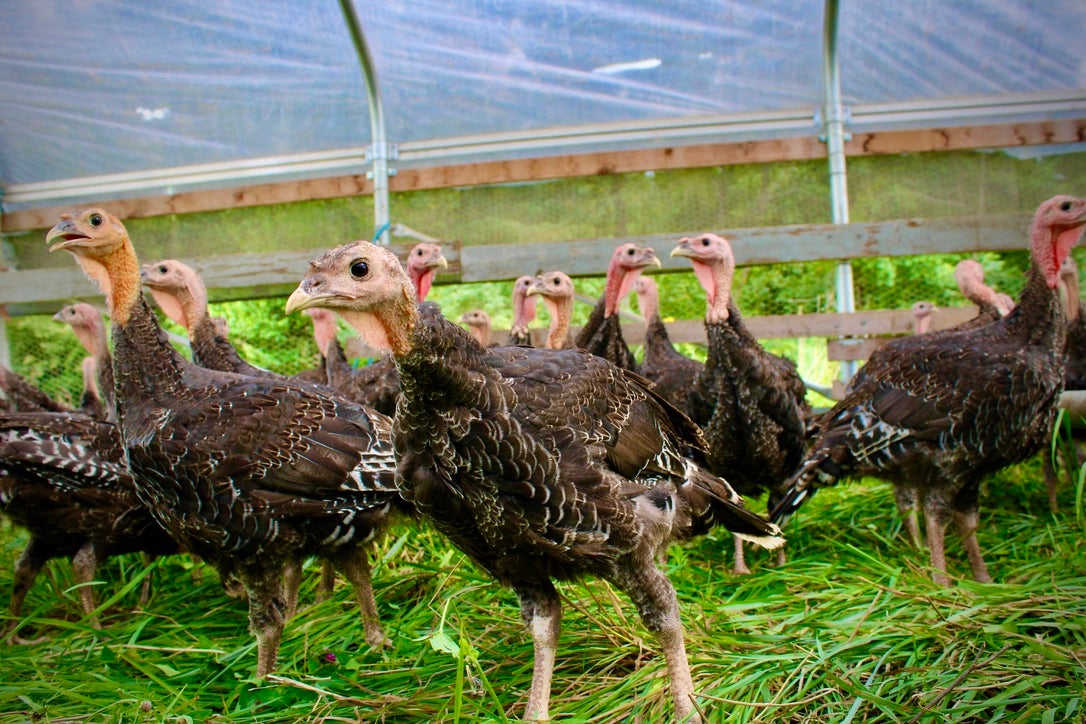Straight from the (Indiana) farmer’s mouth: Buy local turkeys this Thanksgiving
GREENFIELD, Ind. (WISH) — Fresh off being a featured family farm at Willie Nelson’s 2023 Farm Aid Concert in Noblesville, Tyner Pond Farm is gearing up for turkey season.
About four months ago, Tyner Pond farmer, founder, and owner Chris Baggott drove out to Meyers Poultry in Pennsylvania to pick up some 400, one-day-old turkeys. Since then, the turkeys have foraged for the majority of their diet in open pastures and had the opportunity to engage in natural behaviors. They also haven’t been vaccinated, treated with antibiotics, or locked in cages.
“This method of raising poultry is often acclaimed for its ethical and sustainable approach and is known to produce meat that is often considered to be more flavorful and nutritious. It highlights a commitment to animal welfare, environmental health, and product quality,” said Baggott.
It’s no mystery that buying local funnels money back into local communities. Instead of going to ambiguous corporations, the money stays in local communities to invest in schools, roads, and parks.
Baggott says there are also even more direct benefits as well — farm-raised turkeys taste better, provide a higher quality of meat, and are even healthier.
“Pasture-raised turkeys that consume a significant amount of green forages have a higher Omega-3 fatty acid content, given that these fatty acids are abundantly found in green leaves,” said Baggott.
Baggott also says the natural foraging of plants and insects provides a product rich in Vitamin A, Vitamin E, zinc, and iron.
“The end goal is to cultivate a system where the animals, the land, and the people involved are respected and nourished. It aligns farming practices with ethical convictions and consumer expectations, contributing to a more sustainable and humane food system,” said Baggott.
Baggott says at harvest time the turkeys are about five months old. They range in size due to their natural growth, free-range diet, and gender differences.
“Unlike factory farms, where birds might be manipulated to grow uniformly through controlled environments and synthetic additives, pasture-raised turkeys grow at a more natural and individual pace.”
The natural difference in sizes also means that come harvest time, families can choose a bird that is the perfect size for their family.
The one drawback to buying local is the price. It is significantly more expensive to buy a turkey from a local farm. Baggott says that’s due to a variety of reasons including a dedication to regenerative and humane practices, expensive non-GMO feed, more space per bird, and providing workers with middle-class wages.
“Unlike commercial operations, smaller farms do not benefit from the economies of scale, meaning their cost per bird remains high to ensure adherence to ethical and quality standards,” said Baggott.
Turkeys from Tyner Pond are on sale now. Baggott says the sooner people buy, the better, due to limited supply. The farm will sell out.
Turkeys at Tyner Pond range from five to 16 pounds and cost about $7 a pound. Once harvested, the turkeys are frozen immediately are shipped for free to homes to central Indiana.
Cooking suggestions
Baggott points out that cooking a local, farm-raised turkey is different than a conventional, store-bought turkey. Here are his suggestions:
1. Dry Brining for Enhanced Flavor and Moisture:
Dry Brine Method: Generously rub the turkey with a mixture of salt and optional herbs/spices (like rosemary, thyme, and black pepper), focusing on the meat under the skin as much as possible.
Refrigerate: Allow the bird to sit, uncovered, in the fridge for 1-3 days, permitting the dry brine to deeply permeate and season the meat.
2. Temperature Management:
Conducive Cooking Temperature: Roasting at a moderate temperature (around 325°F) can ensure even cooking without drying the meat.
Thermometer Use: Utilize a meat thermometer, aiming for 165°F in the thigh for safety without overcooking.
3. Cooking Time:
Potentially Quicker Cooking: Be attentive, as pasture-raised turkey might cook somewhat faster due to its leaner profile.
Regular Checks: Start checking the internal temperature earlier than standard cooking guidelines to avoid overcooking.
4. Simple Seasoning to Celebrate Natural Tastes:
Opt for Minimalism: Given the rich flavors of pasture-raised turkey, allow it to shine with minimal additional seasoning during cooking.
Buttery Enhancement: Consider using a buttery herb rub for additional richness without overpowering the bird’s natural flavor.
5. Resting Is Crucial:
Ensure Resting Time: Let the turkey rest post-roasting for at least 20-30 minutes, to retain its juices and ensure moist meat upon carving.
“Cooking a pasture-raised turkey with the dry brining method brings out the naturally vibrant and hearty flavors acquired from a life grazing on the pasture. By respecting the leaner, flavor-dense meat with techniques that enhance and preserve its inherent qualities, you serve a meal that not only unique but also honors the bird’s life and the sustainable practices of regenerative farming,” adds Baggott.
Tyner Pond does not offer organized tours, but Baggott says anyone is welcome to stop by anytime and take a look at the operation. Another key component to Tyner Pond is its focus on regenerative farming — using techniques to enhance the quality of soil to “support a biodiverse ecosystem.”
Where to buy local turkeys
Here are a few places where Hoosiers can buy local turkeys this Thanksgiving:
- Tyner Pond Farm
- Hoosier Heritage Farm
- Valley View Turkey Farm
- Gunthorp Farms
- Little by Little Farm
- 7 Oaks Farms: Mooresville, Indiana; 317-539-4013




